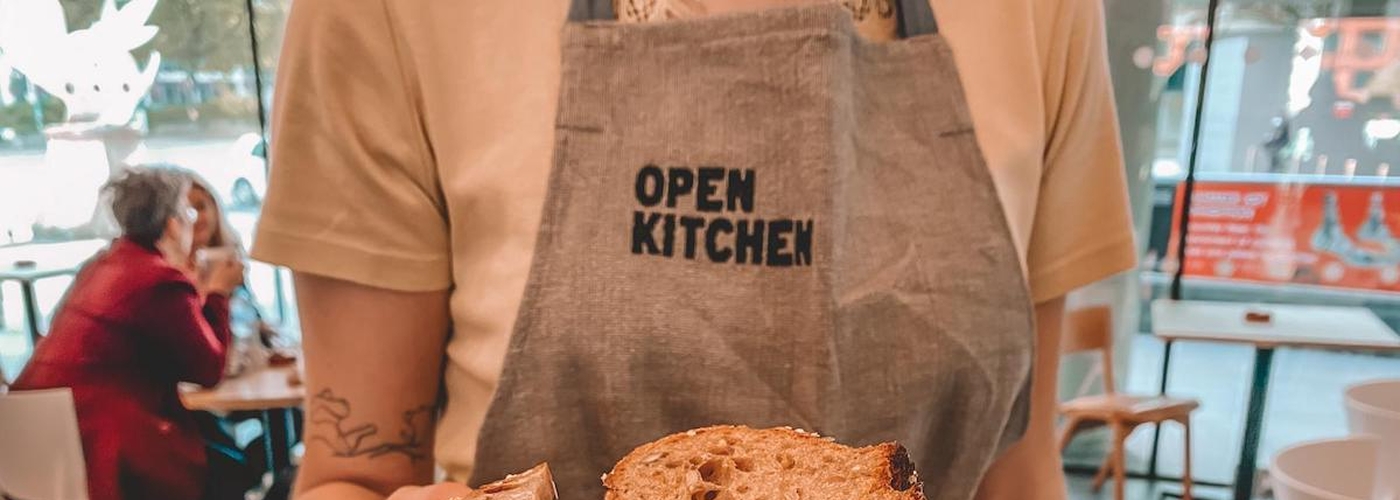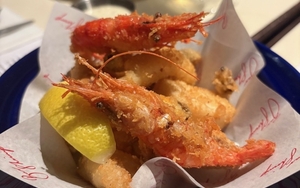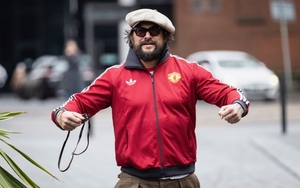We talk to Corin Bell about food waste, sustainability and her new Manchester cafe at People's History Museum
Back in 2017, a little cafe with an anarchic spirit and a big heart opened on Oxford Road in Manchester. It was inspired by a growing movement passionate about combatting food waste called Real Junk Food. The driving force behind the Manchester cafe was human cyclone Corin Bell who along with chef Mary-Ellen McTague, a bijou team and an army of volunteers set about making thousands of meals on a pay-as-you-feel basis from perfectly good food that would otherwise have gone in the bin.
Food doesn't go to waste when it's mouldy or bad or is going to make someone sick. Food goes to waste when it's cheaper to dump it in the system than it is to keep it. Food is a business.
It was brilliant but it was never going to be financially viable long term. Corin and team switched their efforts to running a catering company, Open Kitchen, while continuing to level up their community efforts.
“We knew pay-as-you-feel didn't work, but we weren't sure what we wanted to do. Growing up, I guess, meant realising that if we want to be really sustainable, then that's about environmental, ethical, and financial sustainability. We're not for profit but we're not against it. We're just gonna make sure we do something useful with it.”
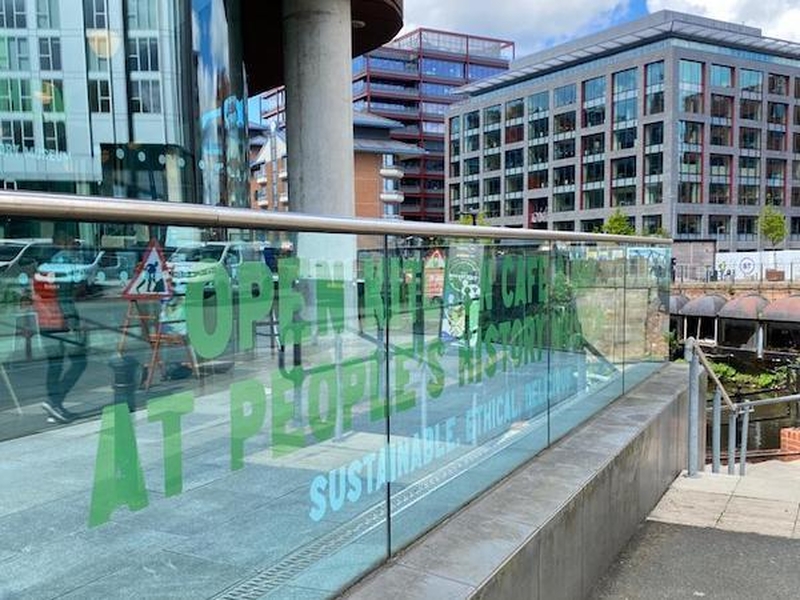
Another cafe was always on the cards "one day", they just didn't bank on a global pandemic.
“We were looking at opening a venue in mid-2020 and then ended up basically running an emergency food provision service - that was never a part of the plan. I think at the height of crisis we were doing 14,000 meals a week.”
Corin's old pal Mary Ellen McTague was doing something very similar with Eat Well MCR at the same time.
“There were a load of different groups, it was lovely and oddly well coordinated. We had us, The Bread And Butter Thing, Mustard Tree, Eat Well MCR and a few other groups that were just swapping supplies between us. The first wave was restaurants and cafes. All the food businesses shut down and lots of them said, 'We don't know when we're going to open again, we're going to empty the fridges and freezers, do you want it?’
“And then the second wave was the wholesalers because you just go up the supply chain. My sense of scale went a little bit out the window. We just said yes to everything. We’ve got a car park with 102 spaces, and one day we turned up and it was full of potatoes.”
As things started to let up and people were looking towards reopening, the opportunity to take over the cafe at the PHM came up and - multiple setbacks later - it's now open.
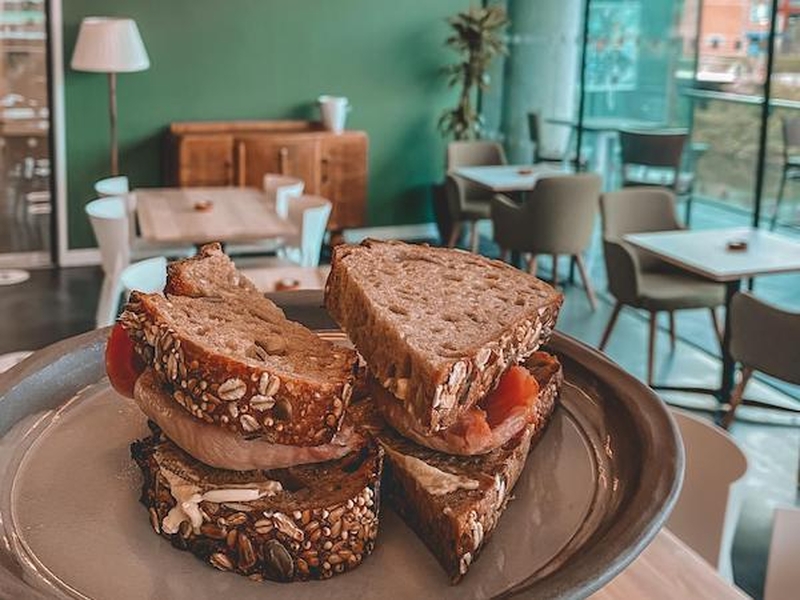
Real Junk Food mark two? Not quite.
“We're still a social enterprise, still a not for profit,” says Corin, “This cafe will be income-generating and that will support our community activities. We still support The Bread and Butter Thing - a Manchester-based charity that does grocery bags for families who are struggling to make ends meet. The idea is to keep people out of crisis and stop that drop into things getting really tricky. We make 1000 vacuum-packed, family-sized meals every week for them.
"You never just fall into poverty with money the only issue. Relationships break down, there are children with particular needs, there's all sorts going on. The families that they're supporting are asking for convenience because when you've got a lot going on, cooking from scratch is not always the easiest thing to do. But that convenience comes at a real price. So we started doing these nutritious but quite simple big one-pot wonders: stews, curries pasta and sauce. They’re not the prettiest things in the world but because they're vac-packed and a chilled product they get a seven-day date on them rather than three days. That means that one of those can go in every bag and that family has one night a week where they just don't need to think or worry. They can just snip, reheat, done.”
In the conversation around our food crisis, there are a lot of misguided good intentions. A number of high profile people recently have implied that people in food poverty simply need to learn some cheap recipes. It can come across as a patronising oversimplification of the issue.
Corin agrees, “Someone might not cook because they’ve got three kids or are living in a private rented house and the cooker's been broken for two months and the landlord won't fix it. There's so much going on in some people's lives. So yeah it's just massively condescending, that whole white middle-class thing of ‘We just need to teach poor people to cook’”
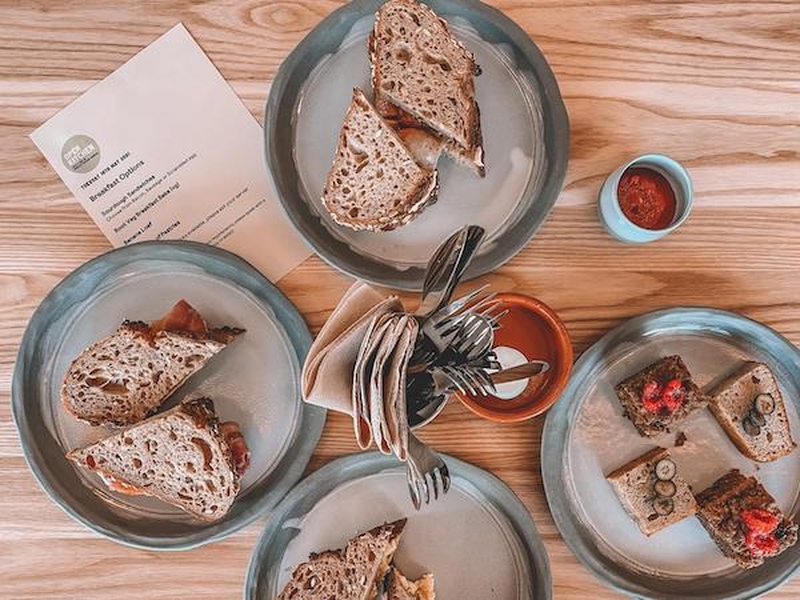
What does Open Kitchen do?
Open Kitchen’s work in the community is vast. It provides meals for a homeless hostel in Whalley Range (run by the charity Stop Start Go), emergency food provision for Manchester City Council, grocery bags for families and individuals who are still shielding, supplies for the women's and families hostels for Manchester City Council and also to Emmeline's Pantry, an independent foodbank. Profits from Open Kitchen's cafe at the PHM will go towards strategic support for other key organisations.
“There are a lot of really brilliant groups out there now involved in emergency food provision that have made it part of their mission statement to end the need for themselves. Those are the people that I think have got some real balls and some real ethics. The Independent Food Aid Network is fab bunch with about 500 independent small local food banks, community pantries, emergency food provision in one guise or another. Part of their mission statement is ending the need for emergency food provision by changing the long term economic and social support system so people don't need food banks. To get people out of poverty in real and lasting ways.
"On the sustainability side, in the short term there is food waste and we will do something useful with it but we're also campaigning to end food waste because perfectly edible food should not be going to waste. Food businesses should be supported and also pressured to design food waste out of the system. Food doesn't go to waste when it's mouldy or bad or is going to make someone sick. Food goes to waste when it's cheaper to dump it in the system than it is to keep it. Food is a business.”
First day nerves, no chance 🤷🏻♀️ our crew absolutely smashed it today. 💚 pic.twitter.com/6Nt5Kx1iZE
— Open Kitchen Cafe & Bar at PHM (@OpenKitchenPHM) May 17, 2021
Has the situation around food waste improved?
“There's definitely been some progress. Groups like WRAP and IGD have made a difference. Some big organisations have signed up. These things always move slowly, they're very strategic and sometimes you feel a bit like you're going in circles for a while and then a piece of legislation will pass or a big company will take a step and others jump on board.
“I think in some ways, [the pandemic] has been good because it's highlighted some of the social issues. In June last year, there were people reliant on food banks that in February last year would have been people who donated to food banks and would never have imagined it could happen to them. When they saw how quickly it did happen, I think it took a lot of the stigma out of it because if you're sort of lofty middle-class person, you will say, oh, it could happen to me, but actually somewhere in the back of your brain, you don't really believe it. You think, actually, I've got savings and I'm a sensible person and not a drug addict so it couldn't really.
“Marcus Rashford is fab and for a young lad, he's a brilliant advocate. I do feel like he’s pushed some of the issues on a bit. But the tricky thing is then there are always people in that space, who want to monopolise on it.
"The message that food waste is a solution to food poverty has really been hammered home. Food waste is a sustainability issue - and to a certain extent, it's a logistical issue. Our planet cannot sustain the amount of food waste that we create - 20 percent of our carbon footprint in the UK is food-related. Poverty is a massive social issue. They have nothing to do with each other. What gets presented is that there is food poverty there is food waste so you apply one to the other and we're done. But actually what that does is it gives an ‘out’ to all the food businesses so it ‘permanises’ food waste and the food system stays unsustainable.
"On the social side of things, it ‘permanises’ that emergency support model that actually stops us changing the structure and getting people out of poverty. So it's a sticking plaster not a solution. But there are some very big businesses that have a real financial stake in the system staying the same and a comms and marketing stake in presenting dumping the outputs of a completely unsustainable system on the charity sector as 'a gift'. They always used the term 'donated', 'We donated this much food to fare share or whichever charities, they're working with. You didn't donate it. Because a donation is a gift. Your rubbish is not a gift.”
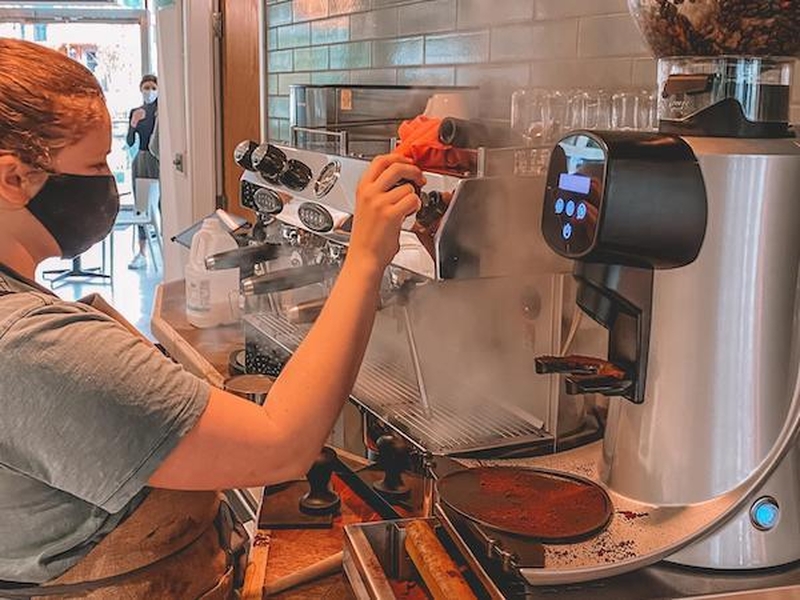
What can you expect from the menu at Open Kitchen at the PHM?
As with many things at the moment, it’s a cautious opening that hopes to build its offering as time goes on. For now, the cafe will be open 8am-4pm weekdays and 9am-6pmish at weekends. In July, it will extend to evening service with small plates and a bar with English fizz and Pinot Noir and no wine shipped outside of Europe.
Because they’re still working with a lot of food that would otherwise go to waste, menus are ever-changing. Breakfast will include Pasture For Life bacon and sausage, organic, free-range eggs and chef-made vegan sausages as well as yoghurt pots, homemade granola and fruit salads. Lunch, will be sandwiches made with organic sourdough and heritage grain bread from Holy Grain. Dinner will be bowls of seasonal British stews, Moroccan tagines, dahl and rice with homemade naan. With a huge focus on preservation, pickles, chutneys and ferments will be plentiful. Food events in collaboration with suppliers are on the cards for the future.
An ethical cup of coffee
Coffee comes from Bird and Wild which Corin tells us is “the highest-rated coffee on Ethical Consumer.” It’s organic, fair trade and “shade-grown”. What does that mean then?
“Coffee plants traditionally grow better under the canopy of tropical plants in a rainforest or jungle environment. Pre-1960s coffee plants got badly scorched and didn't fruit in full sun so in the 60s and 70s, companies developed plants that would grow in full sun. That's led to intensively grown coffee which leads to the clearing of huge amounts of pristine rainforest to grow cash crops. Bird and Wild is using traditional methods which are protecting those jungle and rainforest habitats, growing the coffee trees in amongst it and also creating and preserving habitats for birds.”
“The aim is that everything we do has that story about it,” says Corin, “The meat suppliers that we're working with are little independent farms. We're going to get a whole mutton from this one guy, twice a year, nose to tail it. Our main veg supplier is The Kindling Trust. They're a charity completely focused on organic, vegan, sustainable farming, and they've got a farm in Stockport and one in Leigh so our closest veg supplier is literally seven miles down the road. They've also got a programme that they run called Farmstart, training the next generation of organic, sustainable growers. The average age of a farmer in the UK at the moment is 59 because no one is getting into it. These farms have been in families for generations, the farmers are at retirement age and their kids are in the city somewhere. We haven't found a chicken supplier yet because we can't find anyone who's doing it the way we think it should be done.”
A holistic approach to sustainability
Sustainability goes beyond the food with everything from packaging choices to furniture salvaged, reclaimed or recycled. The chairs are made from recycled ocean plastic, tile is locally made in Lancashire from recycled silicate material, crockery is made from old plates, tiles and clay waste by a French company called Revel. The pendant lights are salvaged, original 1930s, some of the chairs are salvaged old school chairs that Corin tells us is evident in the “naughty words and drawings of willies” on the underside of them. Even the newly made chairs are upholstered in a mix of organic, Fairtrade cotton and polyester made from recycled plastics. The whole place looks sleek and modern.
“We've grown up since Real Junk Food and realised that we can do a lot more if we take people with us rather than getting right in their face. This is an attempt to say we can mainstream sustainability because we can compete. The service, the quality of food, the quality of the coffee. We can be sustainable. We can be ethical, we can not compromise but it can be as good as any other place you'd go in, say, The Northern Quarter.”
“Then the next obvious step is, we've got the outside space here. We’re chatting to Allied London, about the bigger space down the steps because I'd like to create a bit of a secret garden right on the river.
"And then - we get a boat.”
Open Kitchen, @ The People’s History Museum, Left Bank, Manchester M3 3ER





